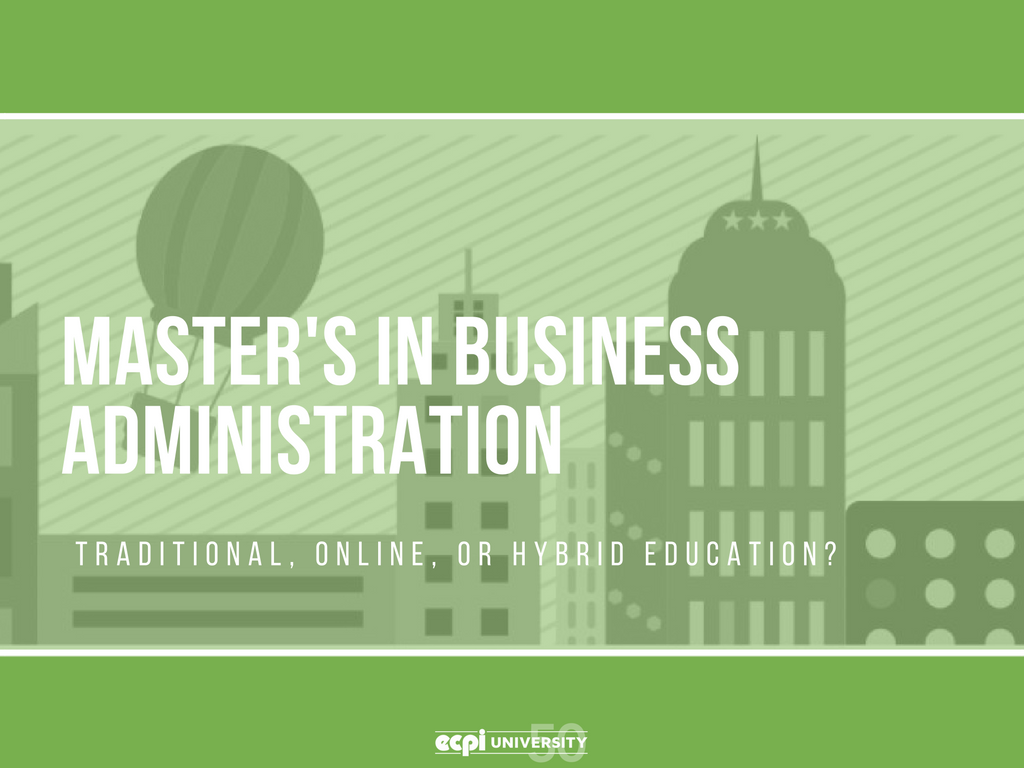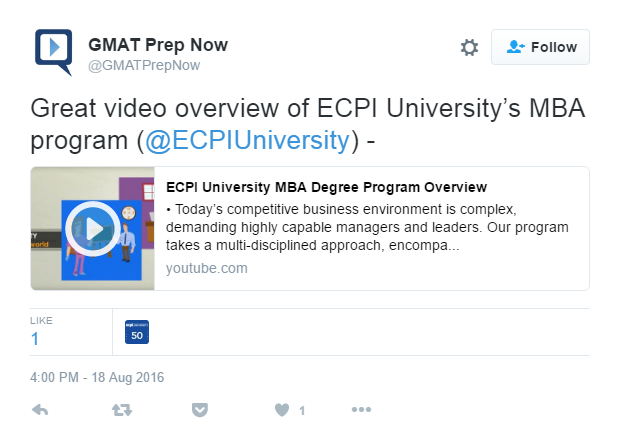Earning an MBA: Traditional Vs. Online Vs. Hybrid
You have decided to pursue a Master of Business Administration (MBA); good for you! Not only will you face a flurry of abbreviations like MBA, P/E and B2B, you also face another decision: getting your degree online, at a brick-and-mortar school, or as a hybrid. Nobody can tell you which one is best for you. As with any big decision, weigh all the factors, then make the choice that fits your life.
The Three Models: Traditional, Online, Hybrid
A traditional MBA program has features seen in schools since the late Renaissance, 500 years ago:
- Classes meeting in actual classrooms
- Teaching assistants and professors lecturing and professing
- Physically sitting among your classmates
- Interacting with the teaching assistant or professor
- Asking spontaneous questions
- Working on group assignments in real time
- Participating in class dialogue face to face
An online MBA program is an updated, streamlined version of the same instructional offerings:
- It is a less expensive alternative to traditional classrooms
- Curriculum is delivered asynchronously, with participants visiting common websites and pages at times dictated by their own schedules
- Advance your learning and your career simultaneously, carving out time for assignments and case studies as you see fit
- Receive instruction anywhere with an internet connection
- Better online MBA programs offer high-quality audio and video
- Confer with classmates through the internet
- Post comments to common discussion boards
- Participate in live discussions via web chat
- Contact your professors and teaching assistants via e-mail
- Online MBA is an interactive environment, offering mobility and a flexible, accelerated schedule
- This method gives the shortest time to course completion
A hybrid model, combining online work with some face-to-face classes, is another route to consider:
- You will be as compelled to participate as you are in an online program (while a traditional classroom may allow you to escape undetected by the professor)
- You will have independent, time-sensitive work to do so that the in-person meetings are meaningful and efficient
- A hybrid offers the flexibility of remotely accessing the class, the structure of deadlines to meet class obligations, and remote interaction of real people in real time
A hybrid MBA program often is at a cost closer to the traditional MBA than the exclusively online MBA. Hybrid programs do not shorten the time needed to earn your degree.
Return on Investment (ROI)
A huge factor in selecting between the MBA models is your return on investment. This is an easy calculation once you have in place two numbers:
- Cost of the investment
- Expected gain from the investment
Say an online MBA program costs $27,000. To calculate your ROI, say experts at Investopedia, simply subtract the cost of the investment from the gain, and divide that difference by the cost of the investment.
What is your expected gain from having an MBA? To put a number to something with so many variables, we turn to the Bureau of Labor Statistics (BLS), which tells us a Master’s degree gives median weekly usual earnings of $1,341, or yearly earnings of $69,732. To compare:
- Bachelor’s degree—$1,137; this is a weekly difference of $204, and a yearly difference of $10,608
- Associate’s degree— $798, which is a difference of $543 a week; this is $28,236 a year
- Some college but no degree—$738, a difference of $603 a week, or $31,356 a year
An online MBA takes around 15 months; round up to 1.5 years. Using BLS averages, you can earn $104,598 in 1.5 years with an MBA. If you can earn $104,598 in 1.5 years with an MBA that cost $27,000, your 18-month ROI is 287.4 percent. After that, earnings are just gravy on top.
Brick-and-mortar schools sharpen the ROI numbers in favor of the online MBA, too. According to the Financial Times—MBAs just call it the FT—a traditional American MBA program lasting 21 months averages $131,000 in tuition and fees. Using similar metrics—we will compare the 21-month cost against two years’ earnings— then, the ROI for getting the MBA at a brick-and-mortar school is ($139,464-$131,000)/$131,000, or 6 percent.
Opportunity Cost
When debating between online or traditional MBA programs, consider opportunity cost (OC). OC is the earnings you forego by attending school, based on the amount of time attending. With an online program, you attend “class” as your current work schedule permits, meeting deadlines and interacting with professors and fellow students as assignments require.
With OC, the FT points out, every month you are still in a program and not out in the market, putting the MBA to use, is money lost. A 15-month online MBA program, then, saves you half a year of time and six months’ earnings when compared to a 21-month traditional program.
Tap into ECPI University’s online MBA program and graduate in 15 months, at a fraction of a brick-and-mortar school’s cost. You can become yet another perfect example that an online MBA provides A-1 ROI; contact ECPI ASAP!
Do you know how you would like to earn your MBA? For more information on MBAs and the benefits of earning one, download our free Whitepaper: Is an MBA Worth It? If you're ready to take the next step, contact an admissions advisor today to discuss your future.
It could be the Best Decision You Ever Make!
DISCLAIMER – ECPI University makes no claim, warranty, or guarantee as to actual employability or earning potential to current, past or future students or graduates of any educational program we offer. The ECPI University website is published for informational purposes only. Every effort is made to ensure the accuracy of information contained on the ECPI.edu domain; however, no warranty of accuracy is made. No contractual rights, either expressed or implied, are created by its content.
Gainful Employment Information – MBA (Master of Business Administration)
For more information about ECPI University or any of our programs click here: http://www.ecpi.edu/ or http://ow.ly/Ca1ya.







